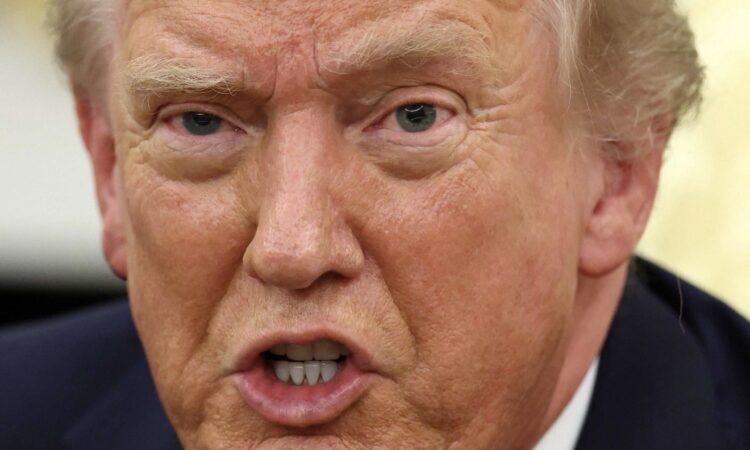
The Trump administration carried out another deadly military operation on Tuesday night, striking what it claimed was a drug trafficking boat — but this time, the attack took place in the Pacific Ocean. This marks a significant expansion of President Donald Trump’s controversial campaign of targeted killings at sea, which until now had been limited to the Caribbean.
Defense Secretary Pete Hegseth confirmed the strike in a post on social media. He said President Trump had personally authorized what he called “a lethal kinetic strike” against a vessel allegedly linked to a terrorist organization involved in drug smuggling in the Eastern Pacific. According to Hegseth, the attack destroyed the vessel and killed two people on board.
This is now the eighth known time that the U.S. military has destroyed a boat accused of drug trafficking under Trump’s direct orders. The previous seven attacks all took place in the Caribbean Sea, leaving at least 34 people dead in total. Critics argue that these are not legitimate military operations but rather unlawful executions carried out without trials, evidence, or any oversight.
The outrage following the latest strike was swift. Many human rights advocates, journalists, and legal experts condemned the administration, accusing it of normalizing extrajudicial killings under the false justification of fighting drugs. Conor Friedersdorf, a writer for The Atlantic, said this latest strike represented “another unlawful killing of a boat our military could have stopped and investigated.” He stressed that even if those on board had been drug traffickers, killing them without trial was immoral and illegal. “Even convicted drug smugglers don’t get the death penalty,” he wrote. “Executing people at sea without proof or process is barbaric.”
Kenneth Roth, the former head of Human Rights Watch, also criticized the Trump administration’s reasoning. He said that calling these operations acts of war made no sense under international law. “Trump’s rationale for his repeated murders at sea doesn’t hold water,” Roth wrote. “No one is attacking the United States, so there is no self-defense claim. There is no war happening, so this cannot be considered armed conflict. These are simply killings without justification.”
Other legal figures have raised similar alarms. Jill Wine-Banks, a former Watergate prosecutor and U.S. Army general counsel, posted a strong warning on social media. She said Trump’s expansion of bombing operations into new waters was reckless and dangerous. “He must be stopped,” she wrote. “This is illegal, immoral, and it puts America in danger of serious international backlash.”
Journalists and analysts have also begun questioning the real motive behind these attacks. Mark Jacob, a veteran reporter, said he doubted that the operations were genuinely aimed at stopping drug trafficking. “The Trump regime lies constantly,” Jacob wrote. “It’s far more likely that these attacks are part of a larger political strategy. Trump wants to intimidate countries like Colombia and Venezuela, especially because of Venezuela’s vast oil reserves and Colombia’s criticism of his previous strikes. This isn’t about drugs — it’s about power and control.”
The international reaction has grown even more heated after one of these U.S. strikes killed a Colombian citizen named Alejandro Carranza, who was reportedly out fishing when his small boat was hit. Colombian President Gustavo Petro condemned the attack, calling it an act of “murder.” He demanded an investigation and an official apology from Washington, saying no nation had the right to kill innocent civilians in foreign waters.
Instead of addressing the death or offering sympathy, Trump responded with hostility. He falsely accused Petro of being “an illegal drug leader who promotes the massive production of narcotics” and announced new tariffs against Colombia, worsening tensions between the two countries. His remarks drew widespread criticism from diplomats and world leaders, who called them reckless and insulting.
Observers say these incidents highlight a worrying trend in U.S. foreign policy under Trump — one where military power is used freely and without accountability. Critics argue that the administration’s approach violates international law and undermines America’s reputation as a defender of justice and human rights. They warn that this pattern of behavior could set a dangerous precedent for future presidents, allowing them to bypass Congress, international courts, and global norms in the name of “national security.”
So far, the Trump administration has offered no verifiable evidence that any of the boats destroyed were actually carrying drugs or weapons. No arrests, recovered cargo, or confirmed terrorist links have been presented to the public. Instead, the justification for each attack has come only through brief social media posts and statements from Trump officials, often without independent verification.
Families of victims in several Latin American countries are now demanding answers. Human rights groups have begun collecting testimonies and evidence, hoping to bring cases before international courts. They argue that the killings amount to state-sponsored executions and may even qualify as war crimes under international law.
Meanwhile, the U.S. military continues to describe these strikes as part of a broader campaign against “narco-terrorism,” but many see that as a political smokescreen. With each new attack, Trump’s critics say the administration is drifting further away from democratic values and closer to the authoritarian use of force.
For now, the deaths at sea continue to raise troubling questions: Who decides who lives or dies out there? What proof exists that these victims were guilty of anything? And if a powerful nation can act as judge, jury, and executioner without evidence, what happens to the rule of law?
Those questions hang over the waves of the Pacific, as yet another boat disappears beneath them — and with it, perhaps, another piece of America’s moral standing.




